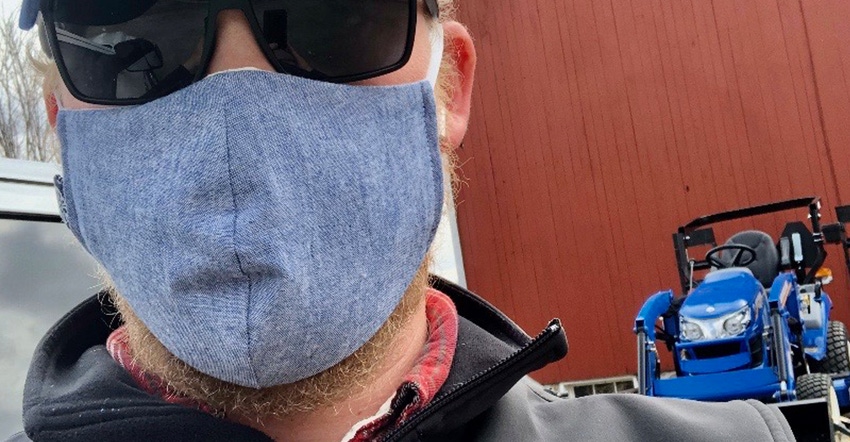
Anyone who knows Beth Herendeen knows she is fiercely protective of family and is very much an out-of-the-box, forward-thinking entrepreneur. She owns Twiggies, a full-service florist and boutique, as well as an event rental business, all out of DeWitt, Mich.
She’s the mother of two adult sons, and her protection mode hasn’t diminished despite now having an empty nest. Her youngest son, Max Herendeen, 25, and his girlfriend, Micalah Blohm, 22, both are considered essential workers in the ag field. Max is a salesman with Burnips Equipment out of Dorr, and Micalah is a crop consultant with Mid-Michigan Agronomy in DeWitt.
“Knowing they both have to be out and coming in contact with other people, and even though you can keep social distance, there’s still a risk,” says Herendeen, whose parents came from farms, her dad from a crop farm in Hillsdale, and her mother from a Hudson dairy. “I wanted to make something to protect them, as well as their client base.”
Knowing any mask is better than nothing, Herendeen set up her sewing machine and got to work, a skill she learned early and has whipped out many 4-H projects. But she wasn’t done with the cloth masks. She went looking for something more.
“I wanted to add something that would provide another layer of protection and serve as a disposable filter,” she explains.
Abiding by the governor’s Stay Home, Stay Safe order, she went rummaging around her house and business for ideas and supplies. “I wanted something dense enough with multiple layers, but yet breathable,” she says.
She first thought of a shammy cloth, usually used to dry vehicles and other surfaces. “But that would mean I would have to go to the store, as I didn’t have one on hand,” says Herendeen, who grew up on a hobby farm in St. Johns.
She looked around and in the mudroom was a bag of puppy pads left when Willy, Max and Micalah’s silver lab, accompanied them on an earlier visit.
“The puppy pad is the perfect makeshift filter,” Herendeen says. “The quilted padding is backed with a very thin plastic that acts as a filter and shield, yet you can still breathe. It stands to reason that if it would block moisture from damaging a surface, it would act as a filter and help block viruses. Who knew right?”
Herendeen sews two pieces of 7.5-by-10-inch fabric together, while adding in four pleats for expansion. She leaves an opening in the bottom for a disposable filter to be placed in it, plastic side out. The pads are cut, producing about nine filters per pad, and she sews around the edges to keep the stuffing and lint from escaping.
Two 28-inch pieces of fabric are used to make the ties for each side. From her floral shop, she fetched aluminum coil about the same width as a nose strip would be on a regular 3M mask.
“I cut a 3.5-inch section and sewed a seam at the top with that in the center so it could easily fit your nose and again aid in protection,” she says.
The filters can be changed out daily or between clients and tossed, while the cloth mask is washable.
“When Micalah is on the road between clients, she can remove the filter, put it into a plastic bag and insert a new filter,” says Herendeen, who is busy trying to produce enough masks for each of them to get through the week and an ongoing supply of filters.
She makes no claims of its level of effectiveness, but says, “It’s super-efficient and affordable, and most of all, I feel like I’m giving them another level of protection.”
Read more about:
Covid 19About the Author(s)
You May Also Like






